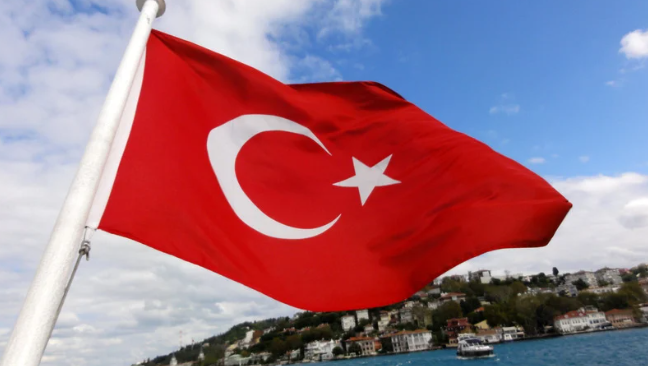Last Updated on April 29, 2023 by Nala Thorpe
Turkey, officially known as the Republic of Turkey, is a transcontinental country in Europe and Asia.
Here are some general facts about Turkey:
| – The capital city of Turkey is Ankara, while its largest city is Istanbul. |
| – The official language is Turkish. |
| – The currency is the Turkish lira. |
| – Turkey has a population of over 83 million people, making it one of the world’s most populous countries. |
| – The country shares borders with eight other countries, including Greece, Armenia, and Iran. |
| – Turkey is known for its rich cultural heritage and historical landmarks, such as the Hagia Sophia and the Blue Mosque. |
| – The economy of Turkey is among the largest in the world, with a diverse range of industries including textiles, automotive, and tourism. |
Whether you’re interested in exploring Turkey’s history, culture, or economy, there’s something for everyone to discover.
History Of Turkey
Turkey is a country with a rich cultural and historical background. It has been home to many civilizations and is known for its beautiful landscapes and diverse culture. Its history dates back to ancient times and it has been a major center of trade and culture throughout its long history.
Let’s take a closer look at the history of Turkey and how it has evolved over the years.
Early Civilizations
Turkey has a rich history dating back to the early civilizations. In addition, the region that is now Turkey has been home to various civilizations since the Paleolithic age.
Some of the earliest civilizations to emerge in Turkey were the Hittites, who established an empire in central Anatolia around 1600 BCE. The Assyrian Empire followed the Hittites and then the Greek and Roman empires.
In the Middle Ages, Turkey became the center of the Seljuk Empire and later the Ottoman Empire, two of the most powerful Muslim empires in history.
Turkey is a modern and vibrant country with a multicultural society and a strategic location at the crossroads of Europe and Asia. Its rich history has left a lasting impact on its culture and architecture, and visitors can explore the remnants of these early civilizations throughout the country.
The Ottoman Empire
The Ottoman Empire was a state that existed from the early 14th century to the early 20th century in Turkey, and at its height, the empire spanned three continents – Asia, Europe, and Africa. The Empire was founded by Osman Bey in 1299 and over time expanded its territories by conquest, trading routes, and strategic alliances.
The Ottomans were known for their military prowess and administrative reforms. They established a system of governance and law that enabled the empire to be one of the most stable and enduring of all time.
In modern-day Turkey, the legacy of the Ottomans is still visible in the country’s architecture, art, literature, and customs.
Pro tip: If you’re planning to visit Turkey, do not miss the opportunity to visit the Topkapi Palace, the former residence of the Ottoman sultans, which now serves as a museum, showcasing the traditional Ottoman lifestyle, culture, and art.
Republic Of Turkey
The Republic of Turkey, located in Western Asia and Southeastern Europe, has a rich history and culture. It was founded on October 29, 1923, with Ankara as its capital and Istanbul as its largest city. Turkey is known for its stunning natural beauty, delicious cuisine, and welcoming people. The country has a population of over 84 million and is home to diverse ethnic and religious groups. Turkish is the official language, and Islam is the dominant religion in Turkey.
| Some of Turkey’s most famous landmarks |
| Blue Mosque |
| Hagia Sophia |
| Ancient city of Ephesus |
The Turkish economy is diverse, with industries ranging from agriculture to manufacturing and tourism. The country’s strategic location at the crossroads of Europe and Asia has played a crucial role in its history and continues to shape its future.
Pro-tip: Try the traditional Turkish breakfast when visiting Turkey and don’t miss out on the Turkish delight!
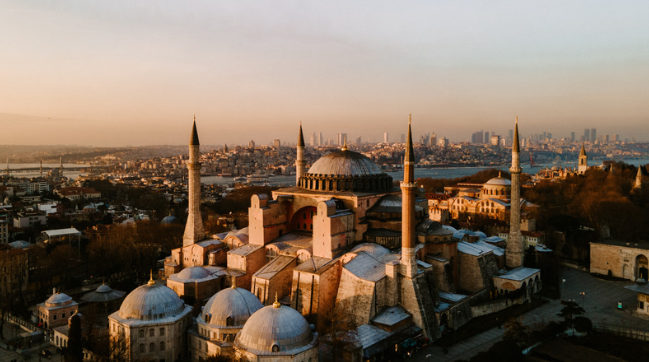
related:https://tr.wikipedia.org/wiki/google_%c3%87eviri google çeviri
Turkey is located in Asia and Europe and has a unique geographical location. The country is mostly covered in rolling hills, mountains, and plateaus. Consequently, the climate of Turkey is highly varied, ranging from the temperate Mediterranean climate of the western coastal areas to the continental climate of the interior highlands.
Location And Borders
Turkey is a transcontinental country spanning across Europe and Asia. The country borders several countries including Greece, Bulgaria, Georgia, Armenia, Iran, Iraq and Syria. The terrain of Turkey is diverse, ranging from mountains, lakes, rivers, and rugged coastal areas.
The climate of Turkey varies depending on the region. Most of the coastal areas have Mediterranean weather characterized by hot summers and mild winters, while the inland regions have a continental climate with hot summers and cold winters. The Eastern side of the country receives significant snowfall in the winter months. Turkey is also prone to natural disasters such as earthquakes and forest fires.
Turkey’s unique location and diverse climate make it a fascinating place to explore.
Natural Landmarks
Turkey is gifted with numerous natural landmarks, including mountains, valleys, rivers, and coastlines. The country’s geography and climate have played an important role in shaping these landmarks, making Turkey a popular tourist destination.
Some of the most famous natural landmarks in Turkey include:
| Landmark | Description |
| Mount Ararat | This stunning mountain is Turkey’s highest peak and is located in the eastern part of the country. Ararat has religious significance for the people of Turkey as well as neighboring countries. |
| Cappadocia | This region is characterized by its unique rock formations, underground cities and cave dwellings. It is one of Turkey’s most popular tourist destinations. |
| Pamukkale | This natural site is famous for its cascading pools of mineral-rich waters, devoid of any vegetation around it. |
| The Taurus Mountains | Located in the south of the country, the Taurus Mountains is a great place for trekking and offers breathtaking views of the Mediterranean. |
These natural landmarks are a testament to the beauty and diversity of Turkey’s geography and climate.
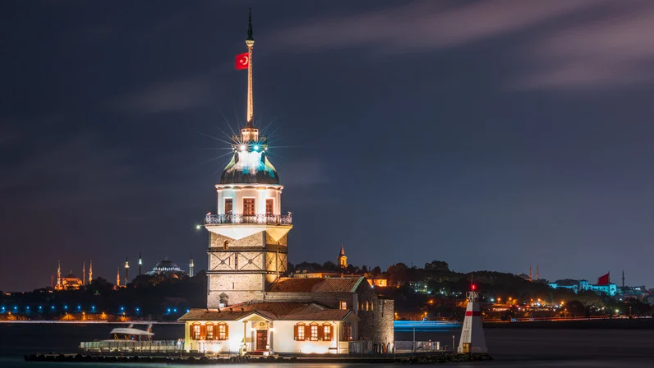
Climate Zones
Turkey is located in a transitional climatic zone between the temperate and subtropical climate zones due to its geographic location, spanning Europe and Asia.
Turkey’s climatic variation is characterized by four seasons; summer, autumn, winter, and spring with varying temperatures and precipitation levels. In coastal areas, temperatures range between 5°C to 30°C while inland temperatures range between -5°C and 40°C.
Turkey has diverse landscapes, including mountains, plateaus, and coastal plains. The Black Sea region is the wettest part of the country, and the coastline along the Mediterranean Sea has a subtropical climate, experiencing hot and dry summers.
The interior of Turkey is known for its long and cold snowy winters, and the eastern region has a continental climate, characterized by a harsh winter and hot, arid summers.
The diverse climate zones in Turkey make it an ideal tourist destination, offering a range of outdoor activities throughout the year.
Culture Of Turkey
Turkey is a vibrant country with a rich culture and history. It is where east meets west, bringing together a unique blend of civilizations. Turkish culture reflects traditional and modern influences, from its vibrant music and dance to its colorful festivals, diverse cuisine and fascinating archaeological sites.
Let’s explore the cultural heritage of this nation in more detail.
Religion And Traditional Beliefs
Religion and traditional beliefs play a significant role in the culture of Turkey. However, with a predominantly Muslim population, Islam has significantly shaped the country’s values, practices, and customs.
However, Turkey’s secular government separates religion from the state, and people from various religious groups are allowed to practice their faith freely. As a result, along with Islam, Turkey is home to various religious and ethnic groups, including Christians, Jews, and Alevis, each with their unique traditions and beliefs.
Turkey’s rich culture also has deeply ingrained traditional beliefs, such as the concept of “karma,” the evil eye, and “nazar”, believed to protect people from the evil eye. These beliefs have their roots in the country’s history, and people continue to hold on to them through generations.
Turkey’s culture is a fascinating blend of religion, tradition, and modernity, making it a unique country to explore and understand.
| Fact: | Turkey is home to some of the world’s most ancient and diverse cultures, including the Hittites, Greeks, and Persians. |
Turkish Cuisine
Turkish cuisine is known for its rich and diverse flavors, influenced by its complex cultural heritage and regional variations. Turkey is a unique blend of East and West, with a fascinating history and vibrant modern culture. The country is situated at the crossroads of Europe and Asia, with around 83 million people. Turkish culture is famous for its hospitality, art, music, dance, and architecture.
Some of the popular dishes in Turkish cuisine include:
| 1. Kebabs: | Grilled meats, often served with vegetables and yogurt. |
| 2. Dolma: | Stuffed vegetables such as peppers, aubergines, or grape leaves. |
| 3. Baklava: | A sweet dessert made with phyllo pastry, nuts, and syrup. |
| 4. Meze: | A selection of small dishes, often served as appetizers. |
| 5. Pide: | Turkish-style pizza, topped with meat, cheese, and vegetables. |
Exploring Turkish cuisine is a great way to learn more about the country and its diverse culture.
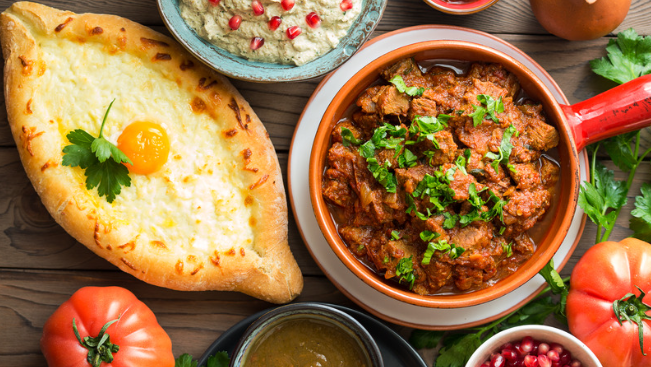
Traditional Arts And Crafts
Turkey is known for its unique traditional arts and crafts deeply rooted in its rich cultural heritage. From pottery and weaving to Turkish carpets and calligraphy, these arts offer an insight into the country’s history and tradition.
Pottery – the art of pottery making originated in Turkey more than 8,000 years ago and became an essential part of Turkish culture. The styles differ according to the region, with Iznik tiles and Kütahya ceramics being the most famous.
Turkish carpets and kilims – known for their intricate designs and bright colors- are among the world’s most treasured rugs.
Calligraphy – an ancient art form practiced for centuries, is widely used to create stylish, intricate Arabic and Ottoman Turkish scripts.
Weaving: Turkey is famous for its traditional weaving methods, and its textiles are known for their intricate designs and high quality. The techniques are used to create fabrics used for clothes, tablecloths, and curtains.
Turkish arts and crafts are a must-see for those interested in the country’s rich history and traditions.
Tourism In Turkey
Turkey is a popular tourist destination, with stunning historic sites, stunning natural landscapes and stunning beaches in one country. So whether you’re looking for a relaxing beach holiday, an active adventure, or a cultural tour, Turkey has something for everyone.
This article will provide an overview of the country’s tourist attractions and destination, so you can make the most of your time in Turkey.
Historical Sites And Museums
Turkey is a country rich in history, culture, and tourism. With thousands of years of history behind it, Turkey is home to many historical sites and museums that attract tourists worldwide.
| Site | Description |
| Hagia Sophia | Originally built as a Christian basilica in the 6th century, Hagia Sophia is now a museum and one of the most popular tourist attractions in Turkey. |
| Topkapi Palace | Once the imperial residence of the Ottoman sultans, this palace is now a museum with exhibits of Ottoman artifacts, treasures, and jewels. |
| Ephesus | This ancient Greek city is home to one of the Seven Wonders of the Ancient World, the Temple of Artemis, as well as other historical ruins. |
These sites and museums offer visitors a glimpse into Turkey’s rich past and cultural heritage.
Pro tip: Plan your visit and consider purchasing a museum pass to access multiple sites at a discounted price.
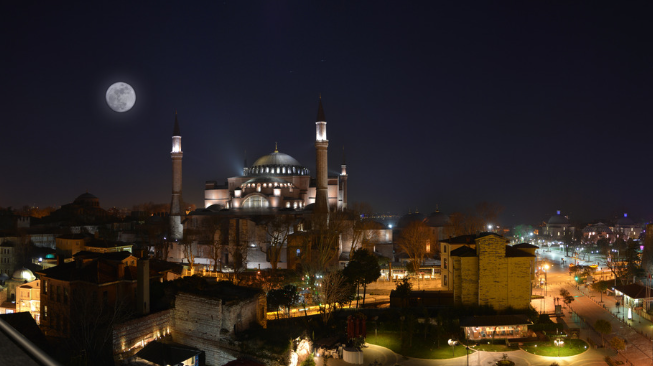
Natural Beauty And Outdoor Activities
Turkey is a land of natural beauty and outdoor activities, making it an ideal destination for tourism. Here’s what you need to know before planning your trip to Turkey:
| Turkey is a transcontinental country, situated in both Europe and Asia. |
| The capital city of Turkey is Ankara, while Istanbul is the largest city, situated at the border between Europe and Asia. |
| Turkey has a rich cultural and historical heritage due to its strategic location on the ancient trade routes between Europe, Asia, and the Middle East. |
| The official language in Turkey is Turkish, and the currency is the Turkish lira. |
| Turkey is known for its beautiful beaches, scenic mountain ranges, and historic landmarks such as the ancient city of Ephesus, the Blue Mosque, and the Hagia Sophia. |
| Popular outdoor activities in Turkey include hiking, skiing, and rafting. |
Pro tip: Don’t miss the opportunity to try traditional Turkish cuisine, such as kebabs, baklava, and Turkish delight, during your visit to Turkey.
Entertainment And Festivals
Turkey is a land of vibrant entertainment and festivals, reflecting its cultural diversity and its warm and hospitable people.
Some of the most popular festivals in Turkey include:
| 1. Izmir International Fair – Turkey’s oldest and largest fair, showcasing local and international products and services. |
| 2. Istanbul International Film Festival – A major platform for new Turkish and international films. |
| 3. Kemer Carnival – A colorful celebration of the end of winter, featuring parades, music, and dance. |
| 4. International Antalya Sand Festival – A display of intricate sand sculptures by artists from around the world. |
In addition to these festivals, Turkey is also famous for its rich cultural heritage, including its Ottoman architecture, ancient ruins, and delicious cuisine. From the grand mosques of Istanbul to the stunning landscapes of Cappadocia, Turkey offers an unforgettable experience for tourists seeking to explore its history, culture, and natural beauty.
Economy Of Turkey
Turkey is a major player in the global economy, with a GDP of $875.7 billion in 2018. The economy of Turkey is the 16th largest in the world, with major industries such as automotive, tourism, textiles, banking, and construction. Turkey is also the world’s 10th largest exporter and 17th largest importer.
This article will provide an overview of the economy of Turkey, with a focus on the key economic sectors.
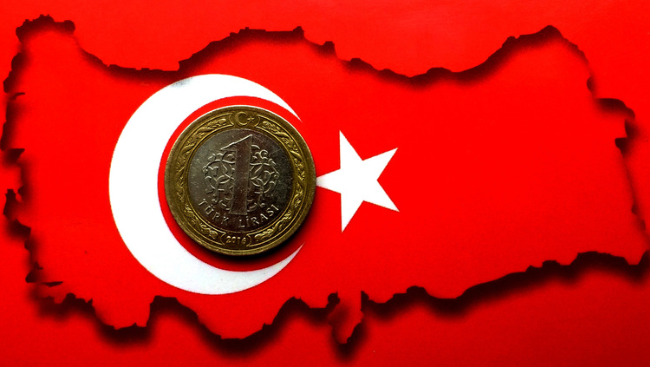
Key Industries
Turkey has a diverse array of key industries that contribute to its thriving economy. Some of these industries include:
| 1. Textile and Clothing: | Turkey is the 6th largest textile and clothing manufacturer in the world, with over 220,000 textile and apparel companies. |
| 2. Automotive: | Turkey produces more than 1 million vehicles annually, making it the 14th largest automotive producer in the world. |
| 3. Agriculture: | Turkey’s diverse climate and fertile land make it an ideal place for agriculture. The country is known for producing a range of crops such as figs, hazelnuts, and pistachios. |
| 4. Tourism: | With its rich culture, stunning coastlines, and ancient landmarks, Turkey is a popular tourist destination attracting over 30 million visitors annually. |
| 5. Energy: | Turkey is an important regional energy hub, with a range of energy resources including coal, oil, gas, and hydroelectric power. |
These key industries play a vital role in driving the Turkish economy to greater heights and contribute to a higher standard of living for its citizens.
Major Trade Partners
Turkey’s major trade partners contribute significantly to its economy, including the European Union, United Arab Emirates, United States, Iraq, and Israel. The EU is Turkey’s largest trading partner, accounting for nearly 40% of its total trade volume, while the UAE is the second-largest, largely due to its booming real estate market and tourism industry.
The United States is Turkey’s fifth-largest trading partner and is a significant importer of Turkish textiles, steel, and automotive parts. Meanwhile, Iraq is an essential source of oil for Turkey, and the two countries have strong economic and political ties. Finally, despite political tensions, Israel remains a crucial trade partner, with machinery and electronic equipment trade volumes.
The diversity of Turkey’s trade partners helps to strengthen its economy and build resilience against potential economic shocks.
Economic growth and challenges
The economy of Turkey has experienced considerable growth in recent years while also facing various domestic and global challenges.
Turkey has a mixed economy with its major industries including textiles, food processing, automotive, electronics, and oil refining. On the other hand, the service sector makes up most of the economy regarding employment and GDP.
However, Turkey also faces several challenges, including high unemployment rates, rising inflation, a large current account deficit, and political instability. In addition, the COVID-19 pandemic caused a significant slowdown in economic activity in Turkey, leading to a recession in 2020.
Turkey has addressed these challenges, including implementing structural reforms, promoting foreign investment, and achieving sustainable economic growth.

